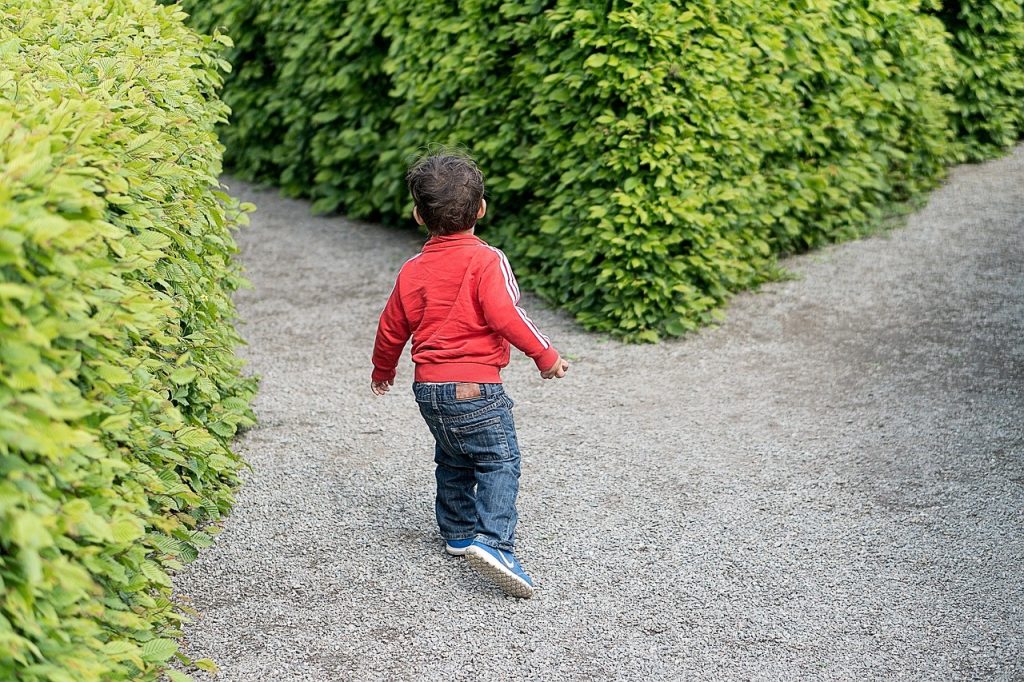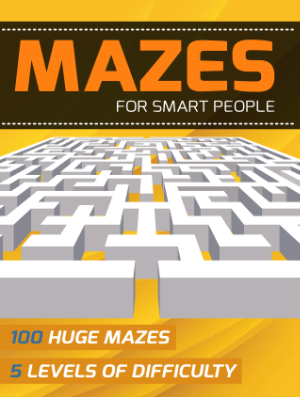From lush green hedgerow labyrinths to intricate, multi-levelled maze books, the enthralling challenge of finding one's way from start to finish has captivated minds for centuries. Mazes, in all their twists and turns, serve as both a playful pastime and a reflection of life's journey. Just as we navigate the winding paths of personal and professional challenges, children manoeuvring through mazes confront dead ends, reroute their strategies, and ultimately find their way out.
This seemingly innocuous activity does more than just entertain; it introduces young minds to the invaluable skill of perseverance, essential for facing the broader challenges of life.
In a world increasingly filled with instant gratifications from the likes of TikTok and YouTube, teaching kids the virtue of persistence through mazes can be a useful parenting tool.
Perseverance is the linchpin of success and personal growth in our ever-evolving world. In life, we are constantly met with unforeseen obstacles, from minor hiccups in plans like a cancelled school lesson or a missed bus, to significant life-altering challenges like loss of a job, illness, or even the death of a loved one. It's not the absence of these obstacles, but the will to persist through them, that often defines our accomplishments and character.
For children, the development of perseverance is even more crucial. As they stand at the threshold of understanding the world, they face a myriad of tasks and challenges, be it learning a new skill, facing academic challenges, or navigating social relationships.
By cultivating perseverance early on, we can equip them not only to overcome these challenges, but to view them as opportunities for growth.
As they mature, this resilience, born from perseverance, becomes the bedrock of their adaptability, self-confidence, and an unwavering belief in their capabilities.
Navigating through a maze serves as a fitting metaphor for the complexities and challenges we encounter in life. Just as we meticulously chart our course in a maze, often anticipating a clear path ahead, so life presents us with unforeseen turns and unexpected dead ends. These moments, though initially disheartening, challenge our resilience and compel us to reevaluate, adapt, and forge onward.
Similarly, in life, when confronted with obstacles, we are prompted to reassess our strategies, cultivate patience, and maintain our determination to reach our goals. The beauty of both life and mazes lies not in an unobstructed path but in the invaluable lessons and growth derived from navigating their intricate passages.
Perseverance is not merely the act of pushing forward, but it's the resilience we display when faced with setbacks. And setbacks, in their many forms, are an inevitable part of any journey, whether we're pursuing a personal goal, a professional milestone, or navigating the complexities of life.
These moments of delay, deviation, or difficulty often serve as pivotal points, prompting introspection, recalibration, and renewed determination. While it's natural to feel disheartened when confronted with a setback, true perseverance shines when we view these challenges not as definitive endings but as opportunities to learn, adapt, and grow stronger.
Embracing this perspective turns setbacks from formidable obstacles into invaluable stepping stones, leading us closer to our aspirations with each hurdle we overcome.
The concept of a growth mindset, introduced by psychologist Carol Dweck, revolves around the belief that abilities and intelligence can be developed through dedication and hard work. It's a perspective that values learning over talent.
When children tackle challenges, such as solving mazes, they aren't just navigating pathways, they're constantly engaging with trial and error, learning from mistakes, and celebrating small victories.
Every twist, turn, and dead end in a maze becomes a microcosm of real-world challenges, teaching kids that failure isn't a reflection of any inability but rather a temporary hurdle. By repeatedly confronting and overcoming these challenges, children can internalise the idea that with effort and resilience, they can improve and succeed.
Mazes then, can be practical training grounds where the foundational tenets of a growth mindset are instilled and nurtured in young minds. This has far reaching benefits, not least when it comes to nurturing self-esteem.
Perseverance and self-esteem are intricately woven together in the tapestry of a child's emotional and cognitive development. At its core, perseverance is the sustained effort against obstacles, and every time a child successfully navigates these challenges, a powerful message is learned: "I can do it."
This simple affirmation, when repeated and reinforced, bolsters a child's self-esteem. Every hurdle overcome not only builds their problem-solving toolkit but also amplifies their belief in their own capabilities. This self-assurance doesn't just relate to the task at hand, but permeates all aspects of their life, shaping their overall confidence.

For children, the journey of persevering, whether in mastering a new skill or navigating interpersonal relationships, becomes a consistent source of evidence that they are capable, worthy, and competent, fortifying their self-worth at each triumphant step.
Mazes, with their intricate pathways and deceptive turns, are more than just puzzles; they're lessons in patience and strategy. At first glance, a maze might appear as a tangled web of choices, tempting a hasty dash towards the finish. However, as the impatient soon discover, impulsiveness often leads to dead ends. What mazes truly demand is a patient, deliberate approach.
With practice, children quickly learn that to successfully navigate a maze, they must observe, plan, and proceed with caution. It's not just about moving forward, but about choosing the right direction. Sometimes that means backtracking. Often it requires taking a pause to reassess the path ahead. This methodical progression can teach kids the value of patience and the importance of a well-thought-out approach – lessons that are invaluable in a fast-moving world that often champions speed over careful consideration.
There's a unique, exhilarating rush that washes over someone when they finally escape a complex maze. For children, this sense of achievement is magnified tenfold. After manoeuvring through a series of twists, turns, and cul-de-sacs, reaching the end of a maze feels like conquering a miniature mountain. And it's more than just a momentary thrill – it's a potent blend of relief, pride, and newfound confidence.
This triumph can reaffirm a kid’s ability to tackle and overcome challenges, providing a tangible testament to their capabilities.
More to the point, the journey through the maze, peppered with missteps and recalibrations, makes the eventual success even sweeter.
For a child, the elation of solving a challenging maze serves as a poignant reminder that perseverance, strategy, and grit often lead to the most rewarding victories.
At first glance, a complex maze can appear daunting, much like a sizeable task we might find in a school or work project. It's a sprawling network of paths, choices, and potential pitfalls. However, one of the subtle yet profound lessons mazes impart to kids is the art of decomposition — breaking down the behemoth into bite-sized challenges, or “eating the elephant one spoonful at a time”.
Instead of viewing the maze as one giant, unsolvable puzzle, children learn to tackle one section at a time. They assess and make decisions based on immediate turns and junctions. This strategy of parsing larger tasks into smaller, actionable steps, makes the maze-solving project less intimidating and more achievable.
As kids traverse the maze, they intuitively develop a sequential approach: first, identify the closest obstacle, then strategise, and move forward. This methodical progression not only makes the maze more navigable but also instills a vital skill in young minds. By learning to decompose larger challenges, whether they be mazes, school projects, or personal goals, children are better equipped to manage and ultimately conquer them with confidence and efficiency.
In the grand tapestry of life, teaching children the art of perseverance stands out as one of the most enduring gifts we can bestow upon them. It's a lesson that, once learned, echoes through countless challenges, victories, and moments of personal growth.
While there are plenty of ways to instil this virtue, the simplicity and intrigue of mazes offer a tangible, engaging, and above all fun means to do so.

Through each twist and turn, mazes subtly reinforce the power of perseverance, preparing our young ones for the broader, more intricate mazes of life, armed with resilience, focus, and an indomitable spirit.
As children trace their fingers or gaze through the winding paths of a maze, they're not just seeking an exit; they're internalising the essence of persistence, learning to navigate setbacks, breaking down seemingly impossible tasks into manageable chunks, and celebrating the joy of accomplishment.
For younger kids, or those starting out with mazes, we highly recommend Amelia Baker’s The Amazing Book of Mazes For Kids. It contains no fewer than eight different kinds of maze, and is filled with fun characters and illustrations.
For older kids, and adults, our own Mazes for Smart People contains a hundred gigantic mazes, over five levels of difficulty.
Finally, for tips and tricks on solving mazes, be sure to check out our guide here.
